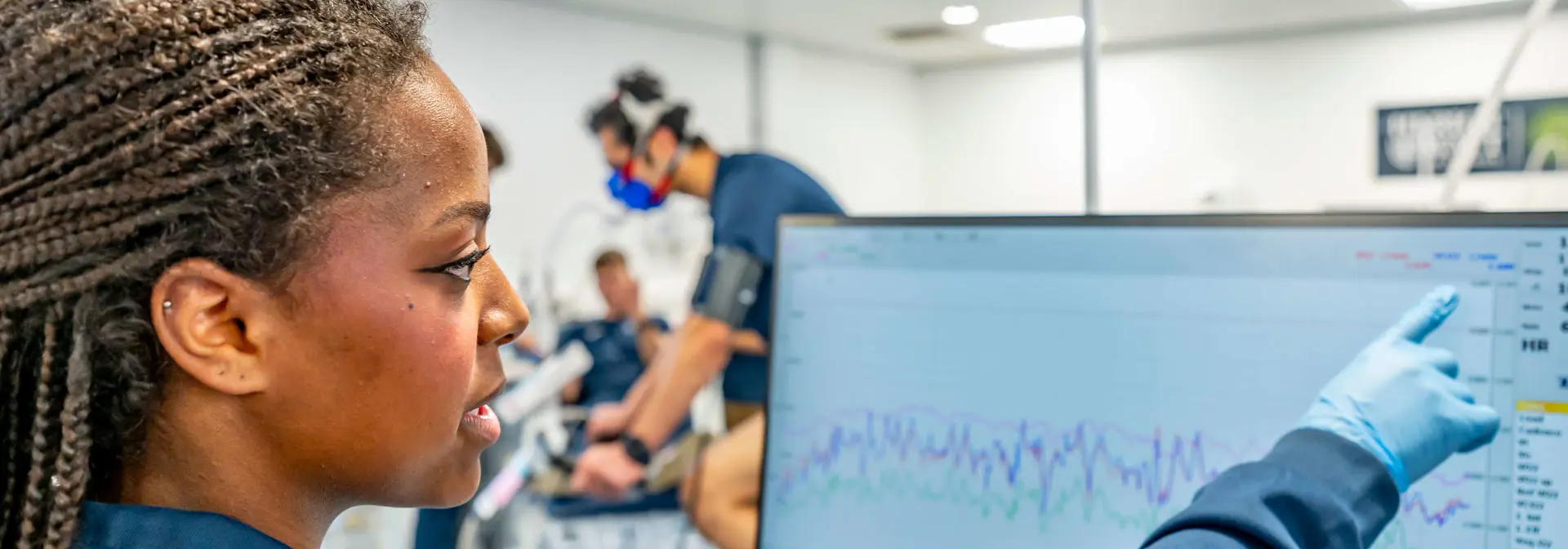Key information
Our MSc Sport Psychology programme at Heriot-Watt University Edinburgh campus combines expertise from our Department of Psychology with the sporting excellence of Oriam, Scotland's Sport Performance Centre.
- Level
- Postgraduate Taught
- Delivery type
- Full Time
- Degree qualification
- MSc
- Mode of delivery
- On-Campus
- Duration
- 1 year
- Location
- Edinburgh
- Start date
- September
This programme is led by expert sport and exercise psychologists and is accredited by the British Psychological Society, a highly regarded marker of quality assurance that prospective employers value. Applicants for MSc Sport Psychology are eligible for Sports Scholarships that we offer for a variety of student athletes. These scholarships are available on an individual and team sport basis and give you exclusive access to benefits as well as a percentage reduction on your tuition fees based on the level of scholarship.
This degree will provide you with a stepping-stone towards the qualifications you need to work with athletes, coaches, and exercisers in sport and exercise contexts within elite sport and the community. This master’s degree is also ideal if you want to pursue further academic study and a career in research related fields.
While studying MSc Sport Psychology, you’ll develop knowledge and skills in Sport Psychology theory and practice in different contexts including elite sport, community sport, team sport, and individual sport. You’ll be supported to develop advanced psychology research knowledge and skills and complete your own independent research project on a topic you are passionate about. You’ll also obtain a variety of transferrable skills that will be useful in careers outside of sport and exercise psychology, both in the public and private sector.
You’ll benefit from the applied practice industry and research networks that are embedded in the programme, which will afford a highly successful trajectory in your career after graduation. Students on the programme have undertaken professional placements at Oriam, Queens Park F.C., Chieftains Rugby and Heart of Midlothian FC Academy. Authentic assessments on the programme are designed such that you will build a portfolio of resources and experiences as trainee sport and exercise psychologists, providing a firm foundation towards progressing in the profession. You will gain knowledge of equality, diversity and inclusion and ethical practice throughout the programme, which are essential skills for a future career in sport and exercise psychology.
Heriot-Watt Sport Programme Scholarship
The Heriot-Watt Sport programme Scholarship offers a 20% tuition fee discount and an annual membership to Oriam, Scotland’s Sports Performance Centre.
Learn moreYour student experience
Our MSc Sport Psychology degree is taught by experienced, leading academics who have published research which shapes their discipline, and which will guide your learning. Academics delivering courses on the programme balance teaching time with research and professional practice in their discipline, including as sport and exercise psychologists in elite contexts. They bring real-world experience to the classroom and extensive professional networks to provide a high quality, supportive learning environment and opportunities for your future careers after the programme.
Go Global
There are currently no Go Global opportunities for this particular programme. However, other Go Global opportunities may be available. Please contact studywithus@hw.ac.uk for more information.
Course content
September Intake - Edinburgh
Year 1
Mandatory September
- Professional Practice in Sport Psychology 1
- Research Methods in Psychology 1
- Psychology of Community Sport
- Psychology of Team Sport
Mandatory January
- Psychology of Individual Sport
- Professional Practice in Sport Psychology 2
- Psychology of Elite Sport
- Research Methods in Psychology 2
Mandatory May
- Independent Project in Psychology
Disclaimer
The courses mentioned above may change between now and the time that you study. For more information, please view our Terms and Conditions.
Programme Video
Study Sport Psychology at Heriot-Watt
Follow Harry's day in the life at a MSc Sport Psychology student, explore our state-of-the-art facilities, and understand why you should choose to study at Heriot-Watt University.
Student testimonials
My MSc in Sport Psychology was a highly formative experience that allowed me to develop as both a practitioner and a reflective professional. The programme challenged me to move beyond performance enhancement and consider athlete welfare, ethics, diversity, and inclusion as central to practice. I particularly valued the opportunity to apply theory to real-world sport contexts, such as designing applied strategies for governing bodies, where I could see how psychological principles translate into meaningful impact. The academic support and feedback throughout the course were invaluable in developing my critical thinking, reflective skills, and professional confidence.
Teaching staff
The MSc Sport Psychology programme welcomes students who have an interest in the psychological approach to sport and exercise performance or participation. We have small interactive teaching groups and opportunities to learn about the theory and research evidence underpinning high performance sport and exercise participation. We also have a real focus on applying these skills in real world contexts and opportunities for students to work alongside sport professionals. We also have Oriam, Scotland's national performance centre on our door step and collaborate closely with the sport professionals and athletes. It's a vibrant and exciting environment to learn and develop your skills.
Fees and funding
| Status | Full Time |
|---|---|
| UK | £12,744 |
| International | £24,952 |
- Status: Your residency status is usually defined as the country where you have been ordinarily resident for the three years before the start of your course.
- International: 'International' includes applicants from European Union countries who do not hold Pre-Settled or Settled status in UK. (This does not include students from the Republic of Ireland - see above).
Additional information
New scholarship offer:
We will offer a scholarship for UK-based students who achieve a 2:1 or better. This scholarship provides a 20% fee reduction and an Oriam gym membership.
Scholarships and bursaries
Coaching Scholarships Programme
Our Coaching Scholarships are designed to attract individuals who are passionate about coaching and developing the sports programme and performance of student athletes. Anyone studying at postgraduate level at Heriot-Watt University, Edinburgh Campus, is eligible to apply for a Coaching Scholarship.
Heriot-Watt Sports Scholarships
Heriot-Watt University Sports Scholarship Programme is delivered in partnership with Heriot-Watt University, Oriam and Heriot-Watt University Sports Union. The programme is designed to embed a high-performance training environment into a student-athlete's weekly schedule.
Entry requirements
We have standard entry requirements for all of our courses that you will have to meet.
Year 1
A minimum of honours degree at 2:2 or non-UK equivalent in psychology or sports science, provided that it contains a research design and analysis module. Psychology degrees must be BPS accredited and therefore have GBC status eligibility.
If you do not meet the above criteria, significant relevant work/life experience (e.g. as an athlete/coach or sport/exercise professional) will also be considered on a case-by-case basis and you may be invited for interview.
We welcome applications from international students and accept qualifications from around the world. Please refer to the entry requirements for your country for more details.
English language requirements
If your first language is not English, we'll need to see evidence of your English language ability.
The minimum English language requirement for entry to this programme is IELTS 6.0 (or equivalent) with no score lower than 5.5 except for writing which must be at 6.0 minimum.
If you do not have IELTS 6.0, we offer a range of English language courses to help you meet the English language requirement for this programme prior to commencing your studies.
Please see our detailed English language requirements.
Why Heriot-Watt
We're the top university in Scotland for graduate outcomes which means that more of our graduates are employed or in postgraduate education than any other institution in the country and we ranked 5th in the UK.
We're also rated number one in the UK for CEO or MD roles, meaning more of our graduates go on to become CEOs or MDs than any other university in the whole of the UK. On top of that, we have beautiful campuses, across the globe, so you'll get a truly international education. Our Edinburgh Campus is home to Oriam, Scotland's National Sports Performance Centre combined with plenty of wellbeing resources, prioritising fitness and mental health for all students. Our Global Research Institutes look at solving real world issues such as climate change and saving our oceans as well as working on the next medical technological breakthrough and the future of AI and robots.
Student life
Explore facilities, and chat to staff and students









